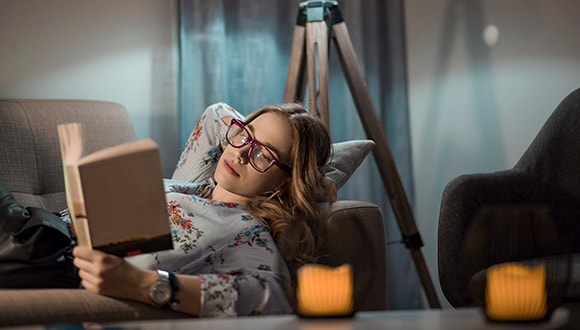Do blue light glasses work?
Experts explain what blue light glasses are, and whether it’s necessary to protect your eyes with them.
Thanks to the convenience of smartphones, tablets and laptops, many of us are spending more time than ever staring at screens. Some people are concerned that more exposure to blue light through screens may harm their eyes and are looking for ways to reduce their exposure with blue light glasses.
What is blue light?
There are two types of blue light: the artificial blue light that comes from screens and devices, and natural blue light, which is one of the seven colours that comes from the sun.
Exposure to natural blue light from the daytime sun is important for setting circadian rhythms – it lets the body know when it’s daytime and helps keep us alert, explains Associate Professor Scott Read, director of research at the School of Optometry and Vision Science, Queensland University of Technology.
“[But] exposure to [artificial] blue light at night before we go to bed can disrupt our circadian rhythms and potentially lead to sleep problems.”

Blue light glasses: what’s the evidence?
It has been suggested that the blue light from devices could impact your eye health, causing eye strain and retinal damage. In response, some optometry clinics are offering a filter for glasses lenses that blocks blue light from getting through, which they claim can protect eyes and improve sleep quality. It can also be applied to non-prescription lenses to create ‘screen time glasses’.
But is there enough evidence to support claims that artificial blue light from devices can harm your eyes, and is a blue light filter on glasses really necessary?
Experts at the Royal Australian and New Zealand College of Ophthalmologists (RANZCO), which trains the country’s eye specialists, aren’t convinced blue light-blocking lenses are needed.
RANZCO reports there’s no evidence to suggest that normal environmental exposure to blue light – including that from digital screen technology – causes damage to eyesight. And there are currently no Australian standards for blue light glasses or screen protectors.
Assoc Prof Read adds that our level of blue light exposure from devices is well below the international safety limits – “so there really is no risk that using a computer or a smartphone is going to cause retinal damage”.
The UK’s College of Optometrists conducted an extensive review of research.
Its conclusion? “The best scientific evidence currently available doesn’t support the use of blue-blocking spectacle lenses in the general population to improve visual performance, alleviate the symptoms of eye fatigue or visual discomfort, improve sleep quality or conserve macular [eye] health.”
But there is evidence that blue light impacts our ability to sleep well.
The best way to reduce that impact is to stop using digital devices about one to two hours before bedtime.

Caring for your eyes
While blue light may not be a risk to our eye health, it’s still important to have good screen habits.
Assoc Prof Read says that if people are experiencing symptoms linked with screen-based work, like problems focusing or sore and irritated eyes, the first step is to have their eyes tested.
When using screen-based devices, Optometry Australia suggests you:
- take regular breaks to rest the muscles in your eyes
- consider dimming screens and lowering blue light at night
- avoid using a screen for one to two hours before bedtime.
We should also encourage good screen habits in kids, says Clinical Associate Professor Heather Mack, an ophthalmologist and former president at RANZCO.
“While the blue light from devices doesn’t damage their eyes, it’s important to teach children from an early age to hold devices or books at least 30cm away from their eyes to reduce myopia [short-sightedness] or myopia progression.”
Children should also spend plenty of time outdoors to reduce the risk of developing myopia, she says.
Time for an eye check? If you’re an eligible member with HCF extras cover, you can get free digital retinal imaging with your eye test in our provider network.
If you’re based in Sydney, book an appointment at one of our dedicated HCF Eyecare centres.
Words by Karen Burge and Nicola Conville
Updated August 2022
Related articles
WHAT IS MACULAR DEGENERATION
Find out if you’re at risk of being affected by this eye disease, how it’s diagnosed and how you can lower your risk factors.
HOW EYE TESTS WORK
It’s important to have an eye check regularly. But how do eye testing machines work and what can the eye tests reveal about your health?
CAN YOU PREVENT SHORT-SIGHTEDNESS?
Short-sightedness is on the rise. We investigate ways to manage and even prevent it in both children and adults.
IS SCREEN TIME HARMING YOUR HEALTH?
How to stop being distracted by your digital devices and start a healthy relationship with technology.